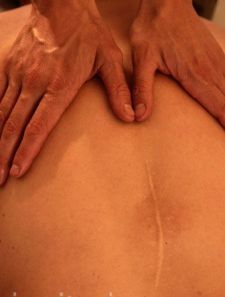Breast cancer itself is difficult enough to emerge from and if a woman has undergone surgery such as mastectomy, this process is still more difficult to emerge from. Keep the following in mind for breast cancer management post surgery:
Take it easy: The post surgery time at home is a time for rest and recovery. Don’t use that time to catch up on house work of other strenuous activities. 
Doing too much too soon can hamper recovery and even increase scarring and scar tissue. It is also best to start Range of Motion Exercises after about a week, even waiting about 10 days before starting structured ROM exercises whether it was a lumpectomy, mastectomy or lymph node surgery.
Scar Massage: Though one may be very sore for several weeks after surgery, as and when able to tolerate it, scar massage is a good idea. Consult with your doctor about the right time for this; correct techniques and lotions or unctions if any that may be required for scar massage.
Sensory Reeducation: Much will have changed after surgery, including the way the area feels and your sensory perception there. Decreased sensitivity or hyposensitivity is commonly seen after having undergone a mastectomy.
The reverse may also be true; that is there could be increased sensitivity or hypersensitivity. A process of sensory reeducation is therefore necessary.
Prevention of lymphedema: The site where the breast cancer surgery or excision of lymph nodes has taken place has to be taken special care of in order to avoid lymphedema.
A compression sleeve may be a good idea particularly for travel or sun exposure. In any case sun exposure on the side of the surgery must be avoided as should any blood draws, insect bites, blood pressure checks and any kinds of shots.
Guard against lymphedema by checking for any swelling of feeling of firmness or discomfort. Any post surgical swelling should begin to reduce in a week or two; however persistent swelling could mean lymphedema and this can occur even a decade after surgery.
Remember cancer surgery makes one more prone to developing lymphedema than someone who has not had surgery. Also the more the number of lymph nodes removed, the more chances there are of developing lymphedema.
Consider all the reconstruction options available to you. Get the help required to come to terms with and deal with your loss, which is admittedly not just physical but emotional as well.















